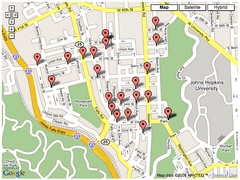Two things from Anthony Flint's talk
I was surprised that Anthony Flint's talk yesterday was about his experience working currently as the education and pr point person for the smart growth efforts for the State of Massachusetts. He didn't discuss at all his new book.

In any case, his presentation was interesting, the normal stuff about smart growth, the cost in providing infrastructure, zoning and other difficulties that make mixed-use projects difficult, and some of the initiatives in the State.
He works for the Governor, Mitt Romney, who is running for president. There was talk in the Q&A about whether or not the office will continue after Romney isn't governor. In any case, Anthony said it would be unlikely he'd be staying.
His larger point is that Massachusetts has provided incentives to municipalities to encourage their following "smart growth" and affordable housing production preferences. (There are 301 municipalities in Massachusetts.)
Anyway, the two things are:
1. To coordinate Housing, Community Development, Transportation, and Environmental Affairs, the Governor created the Office of Commonwealth Development, which is the "smart growth" effort in Massachusetts.
This is somewhat analogous to my point that DC's Office of Planning should be more than a planning office for land use, that it should truly be the master planning agency for all government planning initiatives in the city (i.e., schools, libraries, parks, etc.--all are conducting planning efforts that are disconnected from the Office of Planning's efforts).
2. Getting back to incentives, the Office created a Commonwealth Capital Scorecard for use by jurisdictions to rate their efforts in promoting sound land use and environmental policies. The results are used in part to determine the award of community development and other funds across the state.
I'm thinking that the Citizens Planning Coalition will create a similar evaluative device for use in DC.
Plus what about an ANC Scorecard, rating the effectiveness of ANC Commissioners and ANCs more generally.
As Peters and Waterman said in In Search of Excellence:
What gets measured gets done....
But maybe only if "what gets measured gets seen."
That's why I am impressed by cities like Baltimore and Austin that put their evaluative efforts online, for all to see.-- Baltimore Citistats Program
-- Austin Texas Police department data link
-- City of Austin Performance Measurement Database
-- "Austin puts performance data online" from Government Computing News
-- City of Austin Citizen Surveys
That doesn't mean that cities can't do more. For example, Paul Johnson makes the point that if the City of Baltimore would provide crime data in a particular way (RSS-enabled feeds) he could set up real-time mapping of incidents in this neighborhood.
 Google mapping of crime data for Hampden Village, Baltimore, by Paul Johnson.
Google mapping of crime data for Hampden Village, Baltimore, by Paul Johnson.Index Keywords: planning-organization



0 Comments:
Post a Comment
<< Home